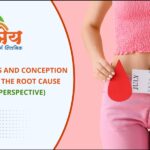Miscarriage or early pregnancy loss is a deeply emotional experience that affects many couples. In most cases, the causes include hormonal imbalance, poor uterine health, stress, genetic issues, or weak reproductive tissues. Ayurveda, through its ancient wisdom, emphasizes prevention, preparation, and strengthening the body before conception, ensuring that both mother and fetus are healthy and stable.
In Ayurveda, miscarriage is referred to as Garbha Srava or Garbha Pata, and the focus is always on identifying root causes and strengthening the foundation (Garbhashaya shuddhi and Beeja shuddhi) before conception.
Ayurvedic Understanding of Miscarriage
According to Ayurveda, a successful pregnancy depends on four essential factors:
- Rutu (right timing)
- Kshetra (healthy uterus)
- Beeja (healthy sperm and ovum)
- Ambu (adequate nourishment)
If any of these are weak or imbalanced, conception may fail or miscarriage may occur.
Miscarriage is often linked to Vata aggravation, weak Shukra/Artava Dhatu, and improper nourishment of the fetus (Garbha poshan).
Common Causes of Miscarriage (as per Ayurveda)
- Excessive physical or mental stress
- Poor digestion (Agnimandya) and toxin accumulation (Ama)
- Hormonal imbalance and weak uterine support
- Previous untreated gynaecological issues
- Poor lifestyle habits (irregular sleep, junk food, overwork)
- Emotional instability or fear during pregnancy
Ayurvedic Approach to Prevent Miscarriage
1. Beej Sanskar (Preconception Care)
Ayurveda emphasizes preparing both partners before conception through detoxification (Panchakarma), Rasayana therapy, and lifestyle correction. This strengthens sperm, ovum, and uterine health, reducing miscarriage risk.
2. Panchakarma (Detox Before Pregnancy)
- Virechan – cleanses toxins and balances Pitta.
- Basti – balances Vata and strengthens reproductive tissues.
- Uttar Basti – purifies and nourishes the uterus.
(To be done under professional Ayurvedic supervision before conception.)
3. Diet for Pregnancy Support
- Include: milk, ghee, soaked almonds, dates, walnuts, moong dal, rice, cooked vegetables, and buttermilk.
- Avoid: spicy, sour, fried, and packaged food.
- Tips: Eat on time, avoid fasting, and maintain proper hydration.
A warm, nourishing, and Sattvic diet supports Ras Dhatu and ensures stable fetal growth.
4. Lifestyle & Mind Care
- Avoid late nights, excessive travel, and heavy work.
- Practice gentle yoga and meditation for calmness.
- Listen to soothing music and surround yourself with positivity.
- Regular Abhyanga (oil massage) improves circulation and relaxes Vata.
Ayurveda teaches that a healthy pregnancy begins long before conception. By focusing on preconception care, uterine strengthening, detoxification, and emotional wellness, miscarriage can often be prevented. A balanced lifestyle and personalized Ayurvedic guidance help build a strong foundation for a healthy pregnancy and a happy motherhood journey.
For personalized Ayurvedic support for conception and miscarriage prevention, contact Aatreya Ayurved Clinic at 9860007992.
FAQs on Miscarriage Prevention & Ayurveda
Q1. Can Ayurveda prevent recurrent miscarriages?
Yes. By strengthening uterine health, balancing hormones, and detoxifying the body, Ayurveda reduces the risk of repeated miscarriages.
Q2. When should Ayurvedic care start?
Ideally, 3–6 months before conception to prepare the body and mind through Beej Sanskar and detoxification.
Q3. Can Ayurveda help in miscarriage due to hormonal imbalance?
Yes. Ayurveda corrects hormonal fluctuations by improving metabolism, digestion, and overall reproductive tissue strength.
Q4. Is Panchakarma safe for women planning pregnancy?
Yes, when done under expert supervision before conception, Panchakarma enhances fertility and uterine health safely.
Q5. What should be avoided after miscarriage?
Avoid physical exertion, stress, heavy foods, and emotional strain. Gentle rejuvenation and Rasayana therapy help recovery.







